
-
 86-21-63895588
86-21-63895588
-
 No.1, Lane 600, Nanchezhan Road, Huangpu District, Shanghai 200011
No.1, Lane 600, Nanchezhan Road, Huangpu District, Shanghai 200011
Release time:2025-04-25
FISF MARCOM April 25th 2025 18:45 Shanghai
On April 24th, Fudan University-Shanghai Pudong Development Bank F-LAB Scientist Entrepreneurship Camp First-session Class was officially launched. As a key measure taken by Fudan University in response to the national strategy of “achieving self-reliance and self-strengthening in science and technology”, the F-LAB program takes the core of “high-quality and high-efficiency industrial core of technological achievements” and converges the scientific innovation resources, alumni ecology and market-oriented capital of the school to construct the ecological system of four-chain integration, namely the “innovation chain, talent chain, capital chain and industry chain”. It is also aimed at accelerating the industrialization of Fudan’s original, disruptive technology achievements and cultivating Chinese technological enterprises and entrepreneurs with global competitiveness.
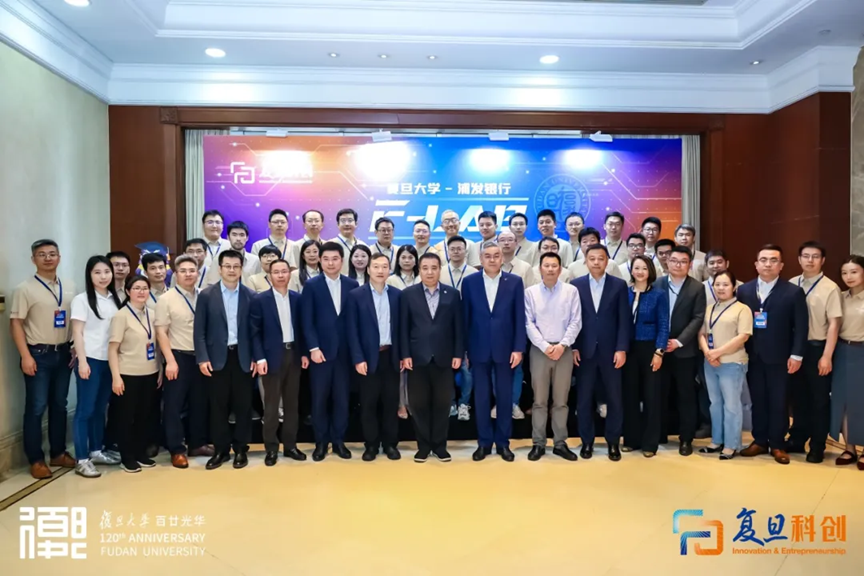
1 From the national strategy to Fudan actions
F-LAB Scientist Entrepreneurship Camp was initiated by Fudan University, hosted by Fudan Scientific Innovation Center, co-organized by International School of Finance, Technology Transfer Center and Alumni Association of Fudan University, and specially supported by Shanghai Pudong Development Bank. The program is a key measure taken by Fudan University in response to the national strategy of “achieving self-reliance and self-strengthening in science and technology”, and focuses on the four hard-tech tracks of life health, integrated circuits, artificial intelligence and new energy new materials. Through the mode of “course empowerment plus practical road show plus tutor guidance”, it is aimed to transform laboratory achievements into industrialization and enable scientists to cross “the valley of death”, contributing Fudan strength to technological innovation in China.
F-LAB adopts the form of “course modularization plus sub-sector deep-dive” and covers the whole process of technology achievement industrialization. Among all the contents, the common course module mainly consists of general education lectures on technology achievement industrialization, the classes of which will be given by academicians, scholars and entrepreneurs altogether to expound the logic and industry trends of technology commercialization; and the industrial practice module is divided into four track workshops of life health, integrated circuits and so on, inviting leading enterprises in the industry to deeply engage with students, helping them to learn through industrial analysis and sub-sector case study and eventually graduate by means of simulated practical road show.
The program demands wholehearted devotion of the students full time, and equips them with a mentor team of “scientist plus entrepreneur plus investor” to ensure the precise matching between technology achievements and market demands. The first-session class has attracted 34 frontier projects to participate, covering both early transformation projects of on-campus scientific researchers and enterprises started by alumni, forming a complementary ecology of “academic originality” and “business practicality”. The projects in the camp include the high-efficiency low-toxicity immune agonist, the fully automatic intelligent microbial detection system, the storage-computing integrated AI chip and other cutting-edge fields.
2 Scientific leaders discussing the future
Li Jin, President of Fudan University and Academician of CAS, and Wei Xie, Deputy Secretary of the Party Committee and President of Shanghai Pudong Development Bank, gave speeches at the opening ceremony. Huisheng Peng, President Assistant of Fudan University, Dean of the Research Institute and Academician of CAS, brought “the first class of technology achievement transformation”, and Pengjun Sun, Director of Fudan Science and Technology Innovation Fund of Funds, made a sharing upon “promoting the high-quality high-efficiency industrialization of technological achievements and being a partner of scientists”.
Li Jin said that the establishment of F-LAB Scientist Entrepreneurship Camp was a key strategic act of Fudan University in response to the requirement of implementing National Education Conference and National Technology Conference and serving scientists’ innovation and entrepreneurship. The purpose of F-LAB is not to encourage professors to start companies, but to “empower the industrialization of technology achievements” and increase the maturity of technology achievements going on to the market. F-LAB is committed to helping scientists to get technology achievements through “the last mile” towards industrialization, including technology evaluation, patent layout, business mode design and investment-financing docking, allowing scientists to concentrate more on overcoming “bottleneck” technology, doing professional things as professionals. He urged the students to do “towering” scientific research with national strategies as the bacon, to be “daring” pioneers with entrepreneurship as the engine and act as “co-existing” partners with open coordination as the ecology.
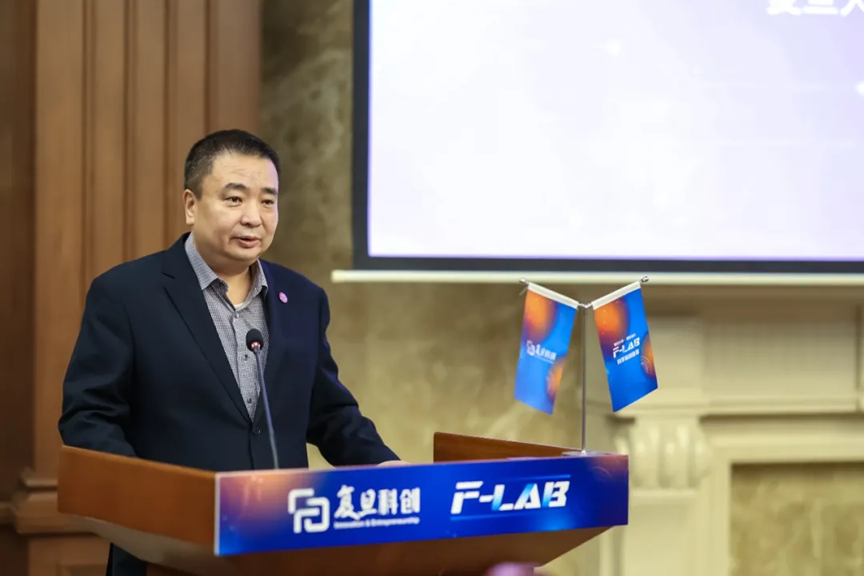
Wei Xie expressed that the launch of the scientist entrepreneurship camp by Fudan University at this time was just a “problem-solver” that builds a bridge between laboratory and industrialization, which could furthermore transform original innovations “from 0 to 1” to industrial breakthroughs “from 1 to 10” and even “from 10 to 100”. Not only does this practice involve the career promotion of individual scientists, more importantly, it also shoulders national strategic missions. As a “financial name card” and a flagship enterprise in Shanghai, Shanghai Pudong Development Bank will always keep pushing forward technology finance construction and serving technology innovation with digitization strategies. By jointly establishing the scientist entrepreneurship camp, Shanghai Pudong Development Bank wished to cooperate with Fudan in cultivating a batch of world-leading “hard-tech” benchmark enterprise and building technology IPs with global influence, setting a new paradigm of bank-university cooperation in the field of science and technology.
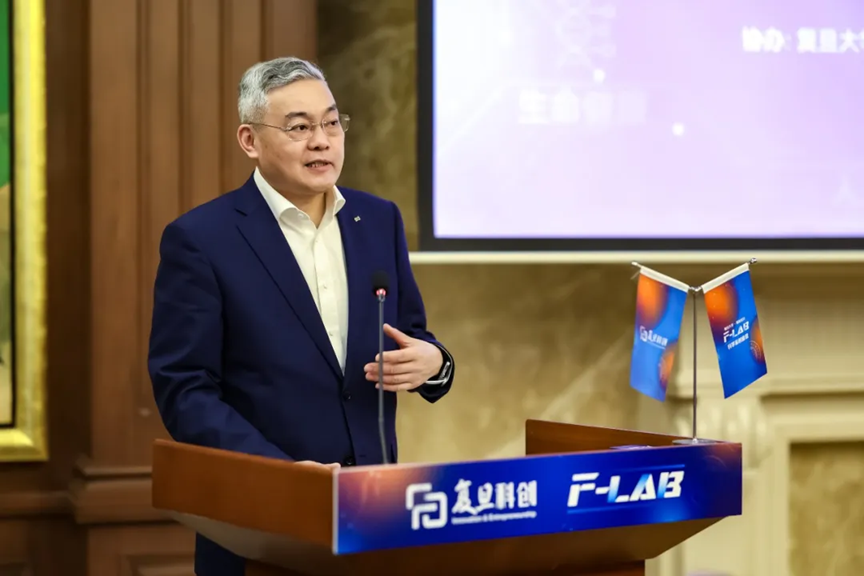
Huisheng Peng focused on the topic of “cross-industry exploration from laboratory to production line” and shared his thoughts on the industrialization of original technology in universities based on his personal experience of achievement transformation in the field of high-performance fiber lithium-ion battery. He especially pointed out that currently the transformation of technology achievements needed to break the “valley of death”, demanding solutions to engineering adaptation issues of laboratory achievements while also requiring a whole-chain ecology of “basic research - concept verification - pilot production - market application”.
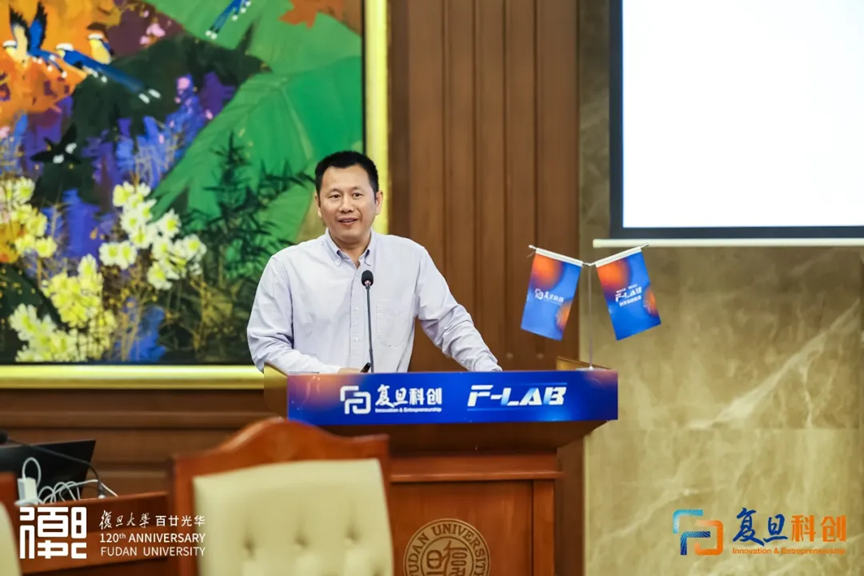
Pengjun Sun gave a systematic introduction of the ecology construction channel for university technology achievement transformation. He stated that at present the transformation rate of domestic university technology achievements was relatively lower than developed countries. Scientists are good at making technological breakthroughs “from 0 to 1”, while what industrialization urgently needs is systematic support “from 1 to 100”. Fudan Science and Technology is dedicated to acting as “a partner of scientists” to unravel achievement transformation block points through “patient capital plus scenario empowerment”. In the future, it will put efforts in “tipping-point” project layout and aim to cultivate Chinese technology enterprise clusters with global influence by two-pronged approach of “investment plus technological investment”.
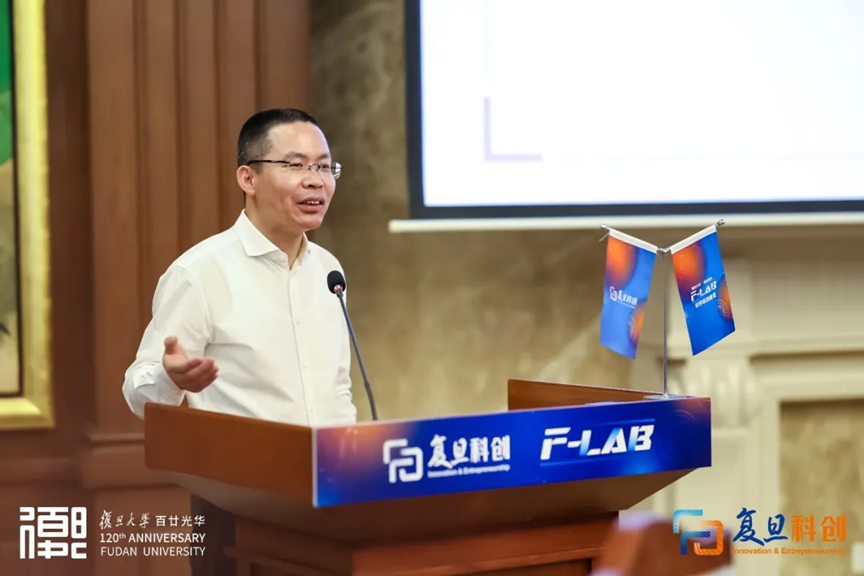
3 Financial gurus sharing profound insights
At a time of increasingly severe global competition and fluctuating economic cycle, how can Chinese economy achieve development and breakthrough? What kind of role is technology innovation playing in the process? And what issues should entrepreneurs and investors pay attention to? Jun Qian, Executive Dean of FISF and Professor in Finance, and Weili Hong, Visiting Professor at FISF, gave shared thoughtful insights and illustrations.
Starting from the current situation of macro economy and finance, Jun Qian profoundly analyzed the comprehensive recovery path for Chinese economy under the current tariff war and new incremental policies. He indicated that in face of a complex international economic situation, one of the key drives for China to promote economic recovery and high-quality development was the commercialization and industrialization of technological innovations and achievements. Chinese technology enterprises should add investment on research and development and improve their own value creation ability so as to occupy a more advantageous position in the global market. Now with the platform of F-LAB Scientist Entrepreneurship Camp, the in-depth integration of technology and finance will bring entrepreneurs new opportunities and challenges, helping them to transform from scientific research to commercialization.
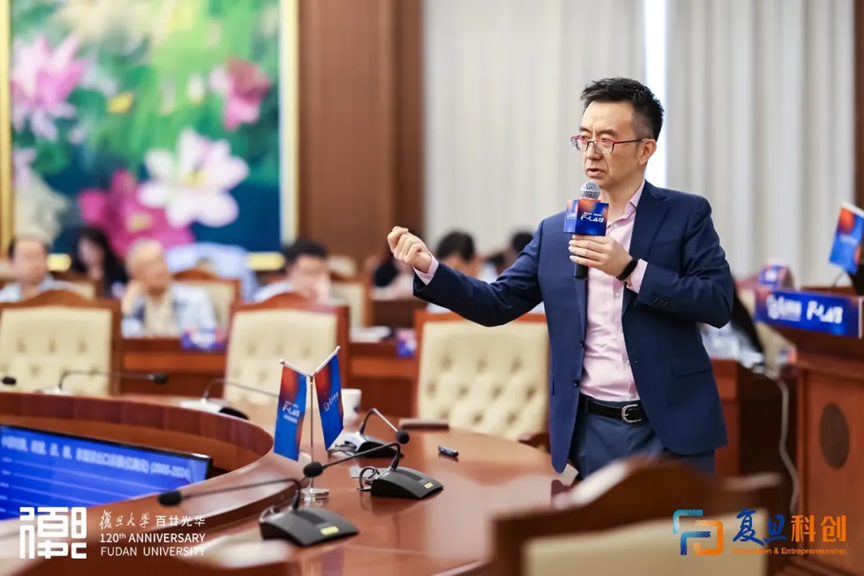
Weili Hong dissected the turbulent history of the Chinese entrepreneurship and investment market, describing its complicated and changeable periodic features as “a mixture of ice and fire”. He marked that ever since 2000, China’s PE/VC industry had mainly gone through five periods. In the fifth period starting from 2021 till now, the domestic PE/VC market has been dominated by RMB funds, with foreign capital outflow uncertain and capital inflow mainly into the technology industry in the broad sense, gradually restoring market confidence. Hong stressed that when in the fifth period, entrepreneurs and investors needed to acutely capture the opportunities and challenges existing in the periodic changes.
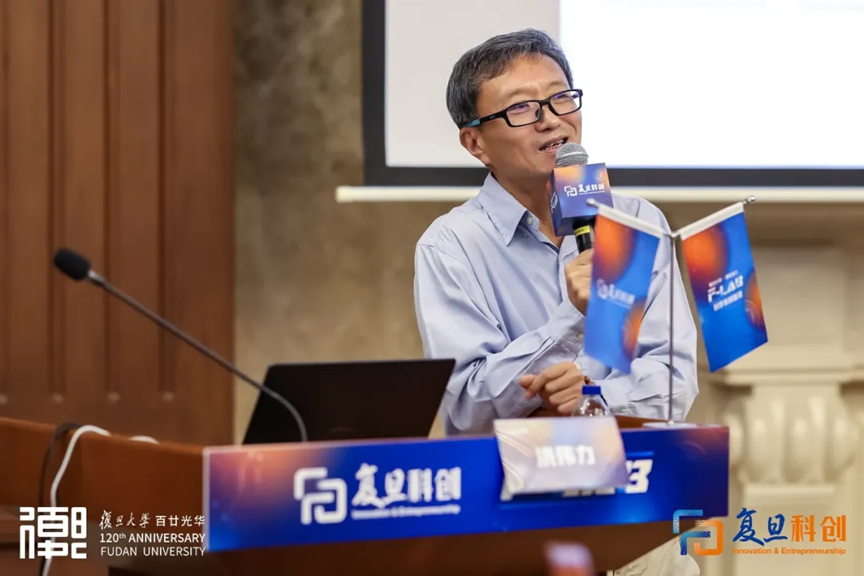
Located in a turbulent situation, only by seizing the anchor point can one stay firm in the trend, and technology innovation is just the anchor point. Therefore, technology achievement transformation acts as the key lever to transform innovation strengths into actual productivity and the new engine to promote industrial upgrading and economic development.
The Masters of Technology Transfer Program being planned by Fudan University is based on the multidisciplinary advantage of Fudan University and focuses on cultivating high-quality leading technical managers. By constructing the industry-university-research joint cultivation mode integrating the four aspects of “degree education, transformation practice, qualification certification and capital support”, the program is devoted to cultivating students’ full-chain capability of technology innovation and technology commercialization, assisting them to take an in-depth part in the transformation of technology achievements.
The FISF EE Program has always been sticking to gathering the abundant industrial, academic and research resources of Fudan University and FISF to provide numerous chances for EE students to learn and co-create. Facing new trends in the future, it will continue to integrate more high-quality resources and build selected courses, creating a collaborative and win-win ecological system for EE students.
Shanghai Pudong Development Bank, a special supporter of the program, has injected capital kinetic energy and ecological resources to offer assistance in the construction of Shanghai International Science and Technology Innovation Center. Actually, as early as December 2024, in order to better help the construction of “Five Centers” in Shanghai, Shanghai International Financial Center in particular, it has been working with FISF and jointly established the frontier application thinktank research institute, SPD Bank-Fudan University Shanghai International Financial Center Construction Research Center, which aims to explore the construction of a new thinktank mode of advantage complementation, bidirectional diversion and mutual empowerment.
4 Student representatives sharing experiences
The launch of F-LAB First-session Class symbolizes the entry of technology achievement transformation of Fudan University into a “ecological and systematical” new stage. Fei Wang, Professor in Material Science at Fudan University, and Zhen Pan, Founder of Shanghai Reunion Biotech Co., Ltd (hereinafter referred to as “Reunion Biotech” for short), shared their experiences of learning in the camp as F-LAB student representatives, and conveyed their determination and confidence in devoting themselves to technology achievement transformation.
“For different application needs in the engineering process, we can identify more specified real problems, and thus create value in the problem-solving process and get technology achievements “on the bookshelf” or “on the goods shelf”. Currently Fei Wang is pushing forward the transformation of sodium battery-related achievements. Combining his own research in the field of new energy materials, he pointed out that his existing team has been devoted to handling the bottleneck about the stability of perovskite solar cells, and that he planned to put emphasis on learning intellectual property layout and industrial resources docking in the course. He called on students to abandon the behind-closed-doors mode and speed up technological iteration and commercialization progress with the help of mentor resources, industrial network and capital support of Fudan Science and Technology Ecology.
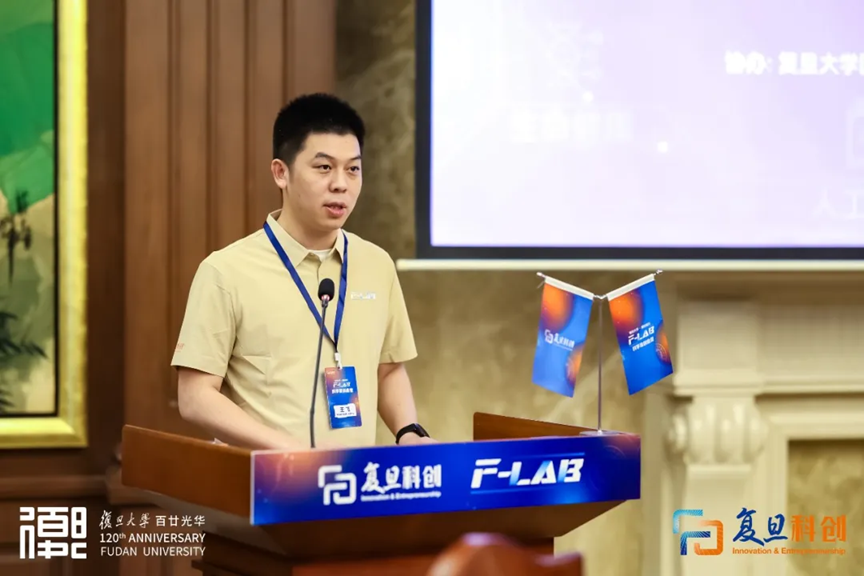
As a Fudan alumnus with many years’ experience of industrialization, Zhen Pan has a deep understanding of the difficulties in the path of technology achievement transformation. In 2018 he founded Reunion Biotech and devoted himself to the industrialized research of medical hydrogel. He took the lead in building the world’s first “ready-to-use” PEG hydrogel technology platform and developed multiple types of Class-3 innovative medical devices for implantation/intervention first initiated in China, filling the multiple gaps in domestic radiation therapy protection field. Participating in the F-LAB courses, he has his own expectations as an experienced hand. “The F-LAB Program gives us a chance to further learn about the development layout of the school. At the same time, by exchanging the latest technology achievement transformation projects with alumni, we are seeking more chances for cooperation.”
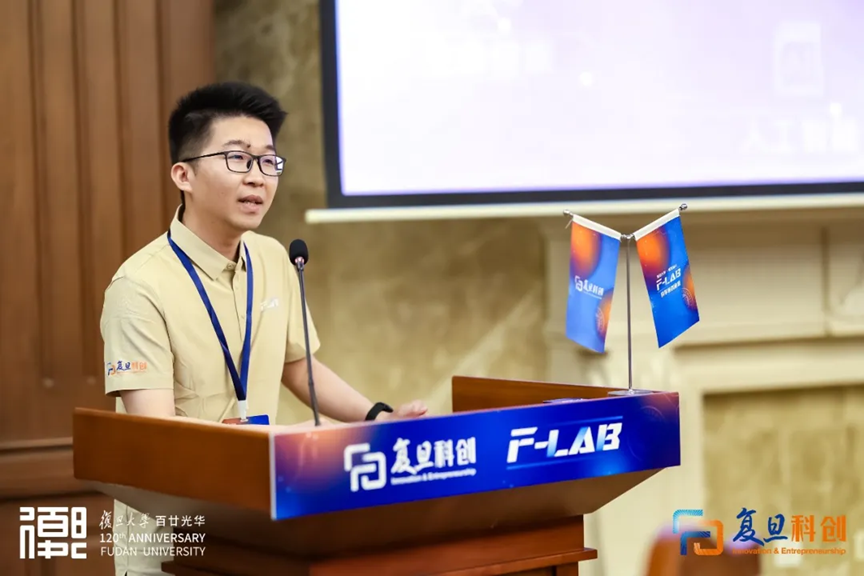
Taking F-LAB as the starting point, Fudan will go further through the key link of technology achievement transformation, build a new paradigm of technology achievement transformation unique to Fudan University through the construction of “transformation”, and bring the camp program from the conceptual stage to the practical application stage. F-LAB will continue to deepen cooperation with strategic partners like Shanghai Pudong Development Bank and promote the high-quality high-efficiency industrialization of technology achievement via various forms of mobile classes, industry visits and practical roadshows. On the other hand, FISF will carry on collaborative innovation with different industrial institutes to boost the in-depth integration of technology and finance and cultivate professional technology achievement transformation talents through diversified courses and practices.